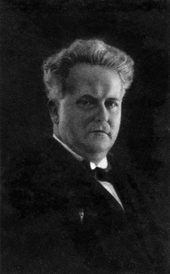Viktor Dyk

Viktor Dyk (born December 31, 1877 in Pšovka near Mělník ; † May 14, 1931 on the Adriatic island of Lopud , Yugoslavia ) was a Czech poet, prose writer, playwright, politician and lawyer.
Life
After high school studied at the Faculty of Law of Charles University in Prague. From 1907 until his death he was involved in the editing of the magazine Lumír , later also Samostatnost (independence). From 1918 he was also editor of the newspaper Národní listy (Volksblatt). During the First World War he was imprisoned in Vienna for his writing activities .
His political involvement began in 1911 when he became a member of the Státoprávně pokroková strana (state progressive party). In 1918 he was involved in the founding of the Národní Demokratická strana (National Democratic Party) and was elected as a member of the party in parliament, in 1925 he became a senator . Viktor Dyk was a staunch opponent of the so-called castle policy of Tomáš Garrigue Masaryk and a member of the Freemasons' Union .
He died of a heart attack while swimming on the Croatian island of Lopud . He is buried in the Olšany Cemetery in Prague.
Literary work
With Petr Bezruč , Fráňa Šrámek and Karel Toman, Dyk belongs to a generation of authors who rebelled against political society at the turn of the 20th century.
Dyk wrote aphoristic , short satire and loved regular, rhythmic verse. His works usually contain a clear punchline, he often used paradoxes . His beginnings were marked by skepticism that stemmed from the fact that he had witnessed the suppression of the uprisings in the first half of the 1890s. Its collections are closely related to the works of the group around the magazine Moderní revue (Modern Revue).
In Milá sedmi loupežníků (Lover of the Seven Robbers), a lyrical-epic ballad, power and passion are on display in a dialogue. The work is shaped by anarchism .
In Devátá vlna (The Ninth Wave) he discovers, melancholy, the premonition of death. In his war tetralogy , he describes an individual's obligation to defend his country and warns against treason.
In Krysař (The Pied Piper) he processes the well-known Pied Piper legend: The Pied Piper is promised a reward for eliminating the rat plague. He does his job, but he is denied wages. That is why he lures the people of the city into perdition with his pipe. At Dyk, only a madman and a child survive. The allegory : the madman no longer has a mind - the child does not yet have one. In the drama Zmoudření dona Quiota ( Don Quixote's Getting Smarter ) he shows the tragedy of the contradiction between dreams and reality.
Poems
- A porta inferi, 1897
- Síla života, 1898
- Marnosti, 1900
- Buřiči, 1903
- Satiry a sarkasmy, 1905
- Milá sedmi loupežníků, 1906
- Pohádky z naší vesnice, 1910
- Giuseppe Moro, 1911
- Prohrané kampaně, 1914
- Lehké a těžké kroky, 1915
- Zápas Jiřího Macků, 1916
- Noci chiméry, 1917
- Anebo, 1918
- Okno, 1921
- Pan poslanec, 1921
- Poslední rok, 1922
- Podél cesty, 1922
- Domy, 1926
- Zpěvy v bouři, 1928
- Devátá vlna, 1930
stories
- Hučí jez a jiné prózy, 1903
- Píseň o vrbě, 1908
- Příhody, 1911
- Krysař, ( Pied Piper ) 1915
- Tichý dům, 1921
- Tajemná dobrodružství Alexeje Iványče Kozulinova, 1923
- Můj přítel Čehona, 1925
- Holoubek Kuzma, 1928
Novels
- Konec Hackenschmidův, 1904
- Prosinec, 1906
- Prsty Habakukovy, 1925
- Soykovy děti, 1929
Plays
- Epizoda, 1906
- Smuteční hostina, 1906
- Posel, 1907
- Zmoudření Dona Quijota, 1913
- Veliký mág, 1914
- Zvěrstva, 1919
- Ondřej a drak, 1920
- Revoluční trilogy, 1921
- Napravený plukovník Švec, 1929
memoirs
- Vzpomínky a komentáře, 1927
swell
- ^ Tajné společenství v Čechách - zednáři (Secret Societies in Bohemia Freemasons) ( Czech ) Homepage of the ČT24 transmitter . Retrieved November 18, 2012.
literature
- Dyk Viktor. In: Austrian Biographical Lexicon 1815–1950 (ÖBL). Volume 1, Verlag der Österreichischen Akademie der Wissenschaften, Vienna 1957, p. 207.
- J. Med: Viktor Dyk. Prague 1988
Web links
- Literature by and about Viktor Dyk in the catalog of the German National Library
| personal data | |
|---|---|
| SURNAME | Dyk, Viktor |
| ALTERNATIVE NAMES | Souček, Viktor (pseudonym) |
| BRIEF DESCRIPTION | Czech poet and politician |
| DATE OF BIRTH | December 31, 1877 |
| PLACE OF BIRTH | Pšovka u Mělníka |
| DATE OF DEATH | May 14, 1931 |
| Place of death | Lopud Island , Yugoslavia |


